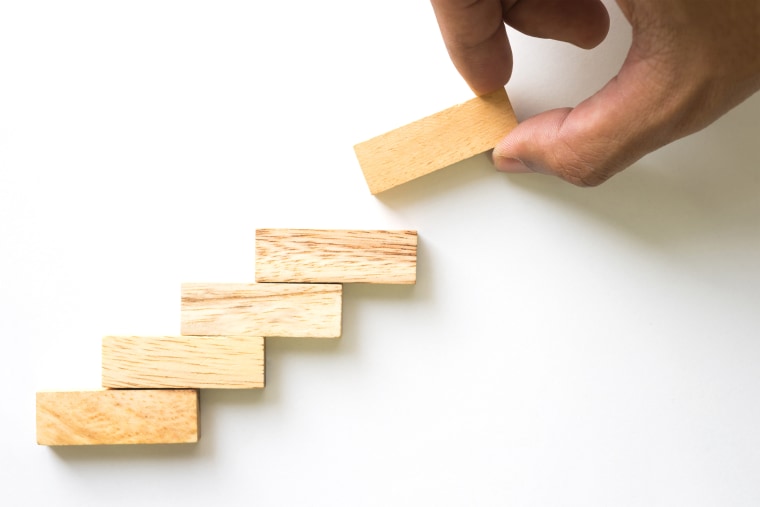Keystone habits are tiny changes that can lead to big transformations, according to Constant Renewal founder Louis Chew.
The blogger said he began implementing keystone habits after reading the book “The Power Of Habit” by Charles Duhigg. According to Duhigg’s theory, even the smallest of habits can trigger major changes, Chew says.
“Essentially, everything else changes just because of this one habit,” Chew tells NBC News BETTER.
For example, let’s say you start waking up at 5 am instead of 7 am.
“It’s quiet, no one is around,” says Chew. “So you realize you have two hours alone. And so when you are alone you do things very differently, especially when it’s in the morning. Your normal patterns aren’t interrupted.”
If you had gone to sleep two hours later instead of waking up two hours earlier, you might have wasted that time watching TV, Chew explains. But early in the morning, he says, you are much more likely to spend those two hours doing something productive.
“For instance, people wake up earlier to get to the gym,” he says.
What’s significant is this small change has a domino effect, he says.
For instance, you can use that extra time to go running, which can help you lose weight. Or you can spend that time making yourself lunch, which can help you eat healthier and save money in the process.
“Basically every single positive activity is linked to waking up early,” Chew says.
Start with “Step 0”
Even small changes can be difficult to make. Instead of focusing on step 1, focus on step 0, says Chew. In other words, start with the smallest change possible.
“You should pick something that is small,” says Chew. “You don’t want to do something that is big.”
For example, if you are used to waking up at 7 am, waking up at 5 am is a big leap.
“So I might set an alarm clock for 15 minutes earlier than I usually do,” says Chew. “15 minutes is very doable.”
As you get more accustomed to waking up early, he says, set the alarm another 15 minutes earlier. Eventually, over the course of a week or two, you will reach your two hour goal. Of course, you’ll also need to start going to bed earlier, he says. That’s something you can also do gradually as you progress.
You really don’t know how big a small change can be because it snowballs so quickly.
Small changes quickly snowball into bigger ones
Chew used keystone habits to eat healthier. For him, step 0 was simply tracking his calories every day, which eventually lead to major lifestyle changes.
“I started exercising, and then after that, because I had to exercise, I had to cut out some of my other activities that were taking up too much time,” he says.
Chew says he stopped wasting time watching TV as a result.
“So that helps get rid of some negative habits, as well,” he says.
Chew says he now realizes your habits are “connected and more related to everything more so than you think.”
Now that he eats healthier, he spends less money on takeout, which has helped him save money for loans and other expenses.
“You really don’t know how big a small change can be because it snowballs so quickly,” Chew says.
How to get started with keystone habits
- Start small. Whether it’s waking up early or counting your calories, developing small habits can lead to big transformations.
- It all starts with “Step 0." Habits can be difficult to form, but not if you start with small, incremental changes. For example, if you want to start waking up at 5 am instead of 7 am, getting up two hours earlier than you’re used to is going to be difficult. But if you start by waking up 15 minutes earlier and add more time as you go along, it’s much easier.
- Watch these changes snowball. Once you start making small changes, you’ll begin to develop other positive habits. If you start waking up earlier, for instance, you’ll have more time to exercise, prepare healthier meals, read, or simply plan your day.
MORE WEIGHT-LOSS SUCCESS STORIES (AND TIPS TO BORROW)
- How a spreadsheet helped this man lose 60 pounds
- These two economists used 'meta rules' to drop 120 pounds
- This man lost 50 pounds with intermittent fasting
- Changing the way she talks about food helped this woman drop 10 pounds
Want more tips like these? NBC News BETTER is obsessed with finding easier, healthier and smarter ways to live. Sign up for our newsletter and follow us on Facebook, Twitter and Instagram.

